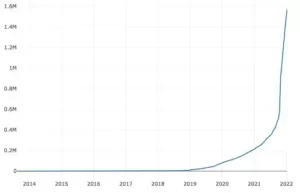As with all things of the modern era, this current story begins at the centre of our capitalist heartland: in the United States of America. Today we shall be taking notes, and notice, of #antiwork, a movement of young workers refusing the hustle of the modern workplace.
What is antiwork?

Antiwork as an idea flowered from a reddit thread called r/antiwork: Unemployment for all, not just the rich. Started in 2013, the channel found a boost in popularity following the pandemic. The rates of unemployment following the advent of COVID 19 has been the highest in two decades, aided by the rising rates of inflation.
In defining this trend, the word ‘work’ has to be understood in context. Instead of referring to any and every work performed in the pursuit of everyday sustenance, ‘work’ in this case refers to scheduled time bound office work in a particular field/career.
The pandemic had already introduced an informal culture to the workplace. With work from home made available in many industries, workers had found it possible to manage their leisure and work much better.
In its aftermath there was growing realization of the draining impact of the modern workplace. To combat this many mid career professionals have begun quitting there office jobs to focus on sustainable employment and a healthy and fulfilling work/life balance.
The USA’s Great Resignation

The Great Resignation, as this phenomena has been named by the media, is most acute in the health and tech industry. The health industry of course saw a surge of activity with the pandemic, and reports of over worked and underpaid health workers flooded the news. On the opposite end, the tech professionals have been complaining about the toxic work culture of their industry for a long time. It is only when faced with the threat of a globally affecting disease that these workers have found the momentum to act on their impulses.
However there are deeper trends at play here than the work cultures of specific industries. This wave of resignations is symptomatic of an overall disillusionment with the idea of an all consuming professional career which had emerged with the liberalization of the world economy since the 1980s.
USA being the neoliberal centre of the modern economy, it is no surprise that the great resignation started within its borders. The overworking culture of the nation had been long since under fire from professionals and politicians alike. Only with the availability of spare time under the pandemic’s window, and the possibility of sharing experiences over social media, have people finally been able to recognize and name their grievances and put to action long held desires.
This is emblematic of many other long gestating demands of the new generation, including forgiveness of student loan debt, better social safety measures and health benefits. In the absence of the necessities of modern life, slavery to large corporations who are least bothered about the welfare of their workers seems a foolish endeavour.
China and the Tang Ping Movement

In August 2021 the collapse of a media worker in the company break-room, and their subsequent death led to the government taking notice of the unhealthy working hours and conditions prevalent in the nation. This incident sparked a reappraisal of the objective of work/ career oriented lifestyle at the cost of personal health and fulfillment.
Thus analogous to the United States’ great resignation began the Tang Ping movement in China, which has captivated its national imagination. Tang Ping, a term which literally translates to ‘Lying Flat’ has gained traction in the country in response to the inhuman ‘996’ work culture, which refers to the 12 hour workday (from 9 am to 9 pm), 6 days a week.
While the movement has drawn the ire of Chinese government officials and business owners, who see this as a threat to China’s economic rise in the global platform, it is growing in popularity among the young workforce of the country. To them this is a way to question the myth of economic development that has pervaded social life for the past couple of decades.
Like the spread of #antiwork, the Tang Ping movement has also found popular discourse in its dissemination through social media. This stands as an example of the universality of the emotion which is driving these processes. Although the ideas of economic development and identification may still be associated with nationalities, the social media space is barely constrained by such boundaries. So the sentiment has overcome the limitations of language to find expression in different contexts, uniting a generation through shared grievances with the functions of reality.
Labour Laws and Centralization
Though it behooves me to call the present time a golden age of anything, it is certainly a flourishing time for freelancers. As droves a people quit their office work, they are shifting to offering their skills and services on a gig basis, working on a sustenance model instead of a model of linear development. Probing into this changing imagination of work, we come to the centralization of power in employment, and a rampant disregard for labour friendly laws.

Image of Ahmedabad Mill Strike 1918
The four new labour codes to be enforced in India by the government are drastically reducing the safety, healthcare, and retirement benefits of workers in the informal sector. Inspection of workplaces is being made even more lax, and unionization and strikes are being made more difficult. These are hard fought rights of workers gained through years of movement, which are being swept aside in favour of the employer/ authority’s ease of functioning. The legislation is shifting from a decentralized, community friendly narrative, to a centralized economy friendly narrative.
This change is not new, and has been ongoing for a long time. The establishment of SEZs, popularity of outsourcing work to cheaper areas, privatization of most industries have hinted at this trend for a while. However, the labour force is currently fighting back, rejecting the career myth peddled by corporations, confronting the hopelessness of the imagination of economic development in the face of rising climate change, poverty, war, and illnesses.
Conclusion
Although there is a predisposition among authorities and government officials to treat these trends as a symptom of millennial laziness, it hints at a deeper dissatisfaction with the construction of a fruitful life. The refusal to engage with the economy on its unfair terms is a push back that has happened sporadically since the industrial revolution, and can be historically studied in sufficient detail. Discouragement and shaming of this movement will in no way help overcome this impasse. There is instead an urgent need to reorganize the structure, addressing the systemic rot that has led to such a dismal situation.







